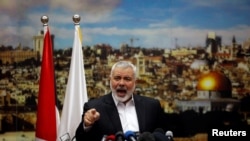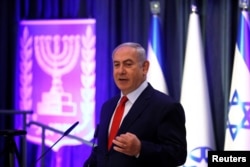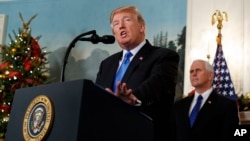Palestinians took to the streets Thursday to protest U.S. President Donald Trump’s decision to recognize Jerusalem as Israel’s capital.
Trump announced the action Wednesday at the White House.
Hundreds of Palestinian protesters clashed with Israeli troops in several areas of the West Bank and Gaza Strip. News reports quoted Palestinian Red Crescent workers as saying that more than 30 people had been injured. The reports also said Israeli forces used tear gas and rubber bullets to control protesters.
Demonstrators burned American and Israeli flags, as well as pictures of Trump and Israeli Prime Minister Benjamin Netanyahu.
The protests came after the leader of the Hamas militant group called for a major armed uprising over Trump’s decision.
The Hamas leader, Ismail Haniyeh, also urged the Palestinians -- and Muslims and Arabs around the world -- to hold protests on Friday, Dec. 8, to express anger against the U.S. decision.
Haniyeh said in a speech the date should be considered “a day of rage and the beginning of a major effort to rise up.”
An aide to Palestinian Authority President Mahmoud Abbas also urged Palestinians to hold protests, but he called for them to be peaceful.
Abbas has condemned the U.S. decision. He suggested it disqualifies the United States as a mediator in peace negotiations between the Israelis and Palestinians.
U.S. negotiators have been involved for more than 20 years in peace efforts aimed at setting up a Palestinian state alongside Israel.
The Palestinians seek to create a state that would include the West Bank, Gaza Strip and east Jerusalem – land captured by Israel in 1967 during the Six-Day War.
Israel has declared all of Jerusalem its capital. However, it is not recognized internationally.
Israeli Prime Minister Netanyahu praised Trump for making the United States one of the first countries to recognize Jerusalem as the country’s capital. He said he believes the move will lead other nations to follow the U.S. decision.
In his announcement Wednesday, Trump noted the move does not mean the U.S. is giving up on peace efforts. Instead, he said it “marks the beginning of a new approach to conflict between Israel and the Palestinians.”
Trump added that he remains “deeply committed” to helping both sides reach an acceptable peace agreement. He said the U.S. would accept a possible “two-state solution” for Jerusalem if the Israelis and Palestinians agree to such a settlement.
However, many political and religious leaders around the world warned that the decision could harm future peace efforts and lead to increased violence.
The European Union’s chief of foreign policy said Trump’s decision “has the potential to send us backwards to even darker times than the ones we are already living in.”
Officials from France, Britain and Germany have also criticized Trump’s action. Turkey strongly condemned the move, while China and Russia also expressed concerns.
Diplomats said the United Nations Security Council is likely to meet Friday to discuss the U.S. decision. The Arab League - which represents states in the Middle East and North Africa – called an emergency meeting Saturday to discuss the issue.
I’m Bryan Lynn.
Bryan Lynn wrote this story for VOA Learning English, based on reports from the Associated Press, Reuters and Agence France-Presse. Ashley Thompson was the editor.
We want to hear from you. Write to us in the Comments section, and visit our Facebook page.
_____________________________________________________________
Words in This Story
quote – v. write or say the exact words of someone
uprising – n. an effort, usually violent, by people attempting to change a government, leader or policy
rage – n. strong feeling of anger
disqualify – v. stop someone from doing or being a part of something
mediator – n. person or organization working with opposing sides in an argument in an effort to get agreement
approach – n. way of dealing with something
committed – adj. willing to give time, energy and effort to a cause
potential – n. chance or possibility that something will happen or exist in the future








